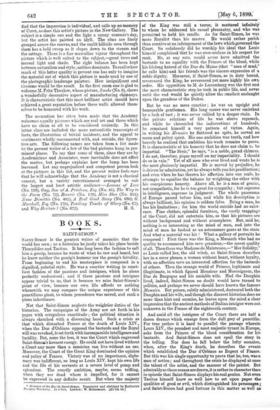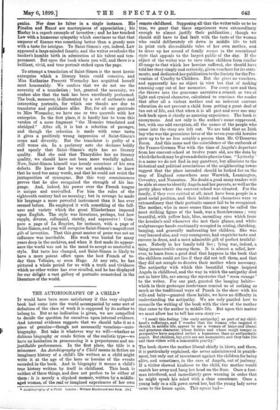BOOKS.
SAINT-SIMON.* SAINT-SIMON is the greatest writer of memoirs that the world has seen ; as a historian he justly takes his place beside Thucydides and Tacitus. It has long been the fashion to call him a gossip, because he wrote of what he saw and heard, but he knew neither the gossip's humour nor the gossip's frivolity. From beginning to end his masterpiece is composed in a dignified, palatial style. He was a courtier writing in court- liest fashion of the passions and intrigues, which he alone perfectly understood ; and if these passions and intrigues appear trivial to us, that is because we miss Saint-Simon's point of view, because our own life affords us nothing wherewith we may compare the unique experience of this punctilious giant, to whom precedence was sacred, and rank a pions inheritance.
Not that Saint-Simon neglects the weightier duties of the historian. The campaigns of the Army are set forth in his pages with scrupulous exactitude ; the political situation is always sketched with a discerning hand. Such a crisis as that which disturbed France at the death of Louis XIV., when the Duc d'Orleans opposed the bastards and the Royal will was revoked, is set forth with incomparable intelligence and lucidity. But, none the less, it was the Court which engrossed Saint-Simoo's keenest energy. He could not have lived without a Court any mere than a musician can live without an ear. Moreover, the Court of the Great King dominated the opinion and policy of France. Victory was of no importance, diplo- macy was indifferent, so long as Louis XIV. kept his own life and the life of his servants at a severe level of pomp and splendour. The courtly ambition, maybe, seems trifling, when they are dead whom it impelled, for it cannot be expressed in any definite result. But when the majesty • Memoirs of the Due de Saint-Simon. Translated and abridged by Katharine Prescott Wortueles. In 4 vols. London : W. Heinemann. VS iSs. ed.) of the King was still a terror, it mattered infinitelf to whom he addressed his casual pleasantry, and who was permitted to hold his candle. As for Saint-Simon, he was more Royalist than his master. He would rather perish than connive at an infringement of the laws which governed the Court. So sedulously did he worship his ideal that Louis himself complained that he was over-zealous in his respect for rank. He, at any rate, would never have admitted the bastards to an equality with the Princes of the blood, while his lifelong hatred of the Due du Maine (that " man of mud," he calls him) and his friends was the sincere expression 9f a noble dignity. Moreover, if Saint-Simon, as in duty bound, reverenced the King, he reverenced yet more highly his own order. His opposition to M. de Luxemburg was the first and the most characteristic step he took in public life, and never until the end would he quietly allow the smallest onslaught upon the grandeur of the Dukes.
But he was no mere courtier ; he was an upright and honourable gentleman. His long career was never smirched by a lack of tact • it was never sullied by a deeper stain. In the private relations of life he was above reproach, and while he chronicled the indiscretions of hundreds, he remained himself a very pattern of virtue. Again, in writing his Menwirs he flattered no spite, he served no mean and paltry spirit. His one ambition was truth, and how bravely he realised that ambition his work remains to prove. It is characteristic of his honesty that he does not claim to be impartial. "The Stoic," he says, "is a noble, grand chimera. I do not, therefore, pique myself on my impartiality. I should do so in vain." Yet of all men who ever lived and wrote he is the most gloriously impartial. He is moved by prejudice, he is driven by admiration, yet he always tells you his predilection; and even when he has thrown his affection into one scale, he attempts to equalise the balance by weighting the other with his conspicuous honesty. Above all, he is a man of genius, not sympathetic, for he is too great for sympathy; but supreme in intelligence, supreme in judgment. The whole panorama of Europe passed before him, and while his description is always brilliant, his opinion is seldom false. Being a man, he has his limitations ; for him the world outside had no exist- ence. Fine clothes, splendid furniture, the costly trappings of the Court, did not entertain him, so that his pictures are without background and without atmosphere. But, said he, nothing is so interesting as the mind of man, and into the mind of man he looked as an astronomer gazes at the stars. And what a material was his ! What a gallery of portraits he composed ! First there was the King, a Monarch who had no quality to recommend him save grandeur,—the rarest quality of all. Then there was Madame de Maintenon,—" Her Solidity," as Louis called her, the old witch, as Saint-Simon describes her in a surer phrase, a woman without heart, without loyalty, with no affection save an interested affection for the bastards of others. Then the strange world of Princes, legitimate and illegitimate, in which figured Monsieur and Monseigneur, the Due de Burgogne and his amiable wife. Had the Dauphin lived, indeed, Saint-Simon no doubt would have turned to politics, and perhaps we never should have known the famous Memoirs. But poison, subtly administered, destroyed both the Dauphin and his wife, and though the discreet historian does no more than hint and surmise, he leaves upon the mind a clear impression that the ancient methods of Italian intrigue were not unknown in the France of the eighteenth century.
And amid all the intrigues of the Court there are half a dozen dramas which emerge from the dull grey of punctilio. For true pathos it is hard to parallel the passage wherein Louis XIV., the proudest and most majestic tyrant in Europe, asks from the Princes of the blood consideration for his bastards. And Saint-Simon does not spoil the story in the telling. Nor does he fall below the lofty occasion, when, after the King's death, he describes the events which established the Due d'Orleans as Regent of France. But this was his single opportunity to prove that he, too, was a man of action; and throughout the crisis he displayed at once the talent of the artist, and the rancour of the patriot. But admimblyas these scenes are drawn, it is rather in character than in episode that Saint-Simon displays his real genius. Not even Tacitu.s himself knew so well how to set upon paper the qualities of good or evil, which distinguished his personages; and Saint-Simon had good fortune in this matter. as well as genius. Nor does he falter in a single instance. His Fenelon and Rance are masterpieces of appreciation ; his Harley is a superb example of invective ; and he has touched Law with a humorous sympathy which convinces us that that emperor a finance Was something better than a greedy man with a taste for intrigue. To Saint-Simon's eye, indeed, Law appeared a large-minded fanatic, and the writer overlooks the banker's humble birth in admiration of his talent and tem- perament. But open the book where you will, and there is a brilliant, vivid, and true portrait etched upon the page.
To attempt a translation of Saint-Simon is the most heroic enterprise which a literary brain could conceive, and Miss Katharine Prescott Wormeley has acquitted herself most honourably. We confess that we do not see the necessity of a translation ; but, granted the necessity, we confess also that the task has been excellently performed. The book, moreover, is illustrated by a set of authentic and interesting portraits, for which our thanks are due to translator and publishers alike. But, for all our gratitude to Miss Wormeley, we have one or two quarrels with her enterprise. In the first place, it is hardly fair to term this version of a mere fragment "the Memoirs translated and abridged." After all, it is but a selection of passages, and though the selection is made with some taste, it gives a positively wrong impression of Saint-Simon's scope and diversity. But the translator is guilty of a still worse sin. In a prefatory note she declares boldly and openly that Saint- Simon's style has no literary quality. Had she said that Thucydides has no literary quality, we should have not been more woefully aghast. Now, Saint-Simon himself was keenly conscious of his own defects. He knew that he was not academic ; he knew that he used too many words, and that he could not resist the juxtaposition of synonyms. But this very consciousness proves that he also recognised the strength of his lan- guage. And, indeed, his power over the French tongue is unique and unrivalled. For him the rules of the eighteenth century had no meaning; but in revenge he made his language a more powerful instrument than it has ever seemed before. He employed it with something of the full- ness and variety which the great Elizabethans imposed upon English. The style was licentious, perhaps, but how supple, diverse, colloquial, stately, and expressive ! Com- pare a page of La Bruyere, for instance, with a page of Saint-Simon, and you will recognise Saint-Simon's magnificent gift of invention. That this great master of prose was not an influence was inevitable. His work was buried for many years deep in the archives, and when it first made its appear- ance the world was not in the mood to accept SQ masterful a style. But taste has changed, and Saint-Simon is likely to have a more potent effect upon the best French of to- day than Voltaire, er even Hugo. At any rate, he has pictured a whole period for us with a truth and vividness which no other writer has ever rivalled, and he has displayed for our delight a vast gallery of portraits unmatched in the literature of the world.







































 Previous page
Previous page